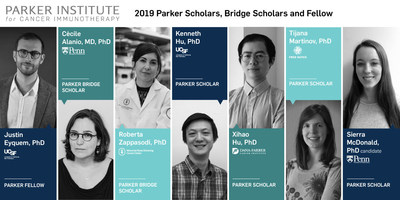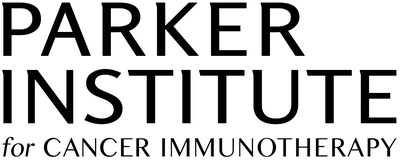Three Programs Provide up to $3.1 Million in Funding for Seven Early Career Researchers
Three Programs Provide up to $3.1 Million in Funding for Seven Early Career Researchers
SAN FRANCISCO, Feb. 6, 2019 /PRNewswire/ -- The Parker Institute for Cancer Immunotherapy recently welcomed seven talented early career researchers in cancer immunotherapy to its network as part of the Parker Scholars, Parker Bridge Scholars and Parker Fellows programs. These researchers will receive a total of up to $3.1 million in funding and the opportunity to train with top scientists in the field, to support them as they embark on their research to move the field forward.

"We continue to train and invest in the next generation of researchers because they are the future of cancer immunotherapy research," said Jeffrey Bluestone, Ph.D., president and CEO of the Parker Institute. "By giving them the opportunity to take risks, explore novel concepts and collaborate with pioneers in the field, we can work with them to push the boundaries of their research and get treatments to patients faster."
Here is a snapshot of this year's awardees and their research:
- Cécile Alanio, M.D., Ph.D., Parker Bridge Scholar at the University of Pennsylvania, studies the impact infections have on T-cells in healthy patients and plans to apply her findings to generate new approaches to treating cancer patients with immunotherapy. Her goal is to bridge the gap between basic science and clinical research to create effective personalized immunotherapies.
- Kenneth Hu, Ph.D., Parker Scholar at the University of California, San Francisco, is fascinated by the power of the immune system, especially in the context of the tumor microenvironment. He will develop methods for merging information from single-cell profiling and microscopy to map out immune cells and their interactions in the tumor microenvironment.
- Xihao (Sherlock) Hu, Ph.D., Parker Scholar at Dana-Farber Cancer Institute, will focus on tumor antigen discovery. After collecting a large amount of data, he designed a deep learning framework for the binding specificity of B-cell receptors. He will study the interactions between tumor antigens and tumor infiltrating B-cells.
- Justin Eyquem, Ph.D., Parker Fellow at the University of California, San Francisco, is interested in improving CAR-T cell function in solid tumors. He will focus on reprogramming T-cells using a genome-editing platform he developed to maximize their anti-tumor function in immunosuppressive tumor microenvironments. He is looking forward to joining a community of top experts to help advance his research.
- Tijana Martinov, Ph.D., Parker Scholar at Fred Hutchinson Cancer Research Center, is excited to take risks and address big problems in cancer immunotherapy. Working in multiple myeloma, she will design and test T-cells to effectively target and destroy cancerous cells, with plans to translate her findings into the clinic.
- Sierra McDonald, Ph.D. candidate, Parker Scholar at the University of Pennsylvania, seeks ways to improve CAR-T therapy response rates by looking at the HMG-box family of proteins. She is looking forward to connecting with clinicians who can help her expand her work to cancer patients.
- Roberta Zappasodi, Ph.D., of Memorial Sloan Kettering Cancer Center, was named a Parker Scholar in 2016 and is transitioning to a Parker Bridge Scholar. As a Scholar, she made a pivotal discovery in her career by characterizing a new population of immune-suppressive T-cells. As a Bridge Scholar, she will aim to understand how this new population can be used to improve the efficacy of immunotherapy with checkpoint blockade.
"Being part of the Parker Institute's family has been an exceptional experience," said Zappasodi. "I've been exposed to new science by some of the most impactful scientists, which has inspired me and provided me with a timely and comprehensive understanding of key developments in the cancer immunotherapy field. When I go back to my lab after these interactions, I think more broadly and in a more creative way, which helps me ask the right questions and ultimately move my research forward more efficiently."
This new class of early career researchers joins current Parker Scholars Zinaida Good, Ph.D., of Stanford Medicine, and Andrew Rech, Ph.D., of the University of Pennsylvania; current Parker Bridge Scholars Alexander Huang, M.D., of the University of Pennsylvania, Scott James, M.D., Ph.D., of Memorial Sloan Kettering Cancer Center, and Ansuman Satpathy, M.D., Ph.D., of Stanford Medicine; and current Parker Fellows, Katelyn Byrne, Ph.D., of the University of Pennsylvania, and Santosha Vardhana, M.D., Ph.D., of Memorial Sloan Kettering Cancer Center.
Watch short video clips to learn more about our Parker Scholars, Bridge Scholars and Fellows: https://www.youtube.com/parkerinstituteforcancerimmunotherapy.
About the Programs
The Parker Institute launched the three programs in spring of 2016. The Parker Scholars program supports graduate students and researchers entering their first postdoctoral appointment who are focused on high-impact, high-risk projects. The Parker Bridge Scholars program supports senior postdoctoral investigators as they transition to faculty positions. The Parker Fellows program supports investigators who have recently completed their M.D. or Ph.D. and are ready to establish a laboratory or independent program in cancer immunotherapy.
Parker Scholars, Bridge Scholars and Fellows receive more than funding from the Parker Institute. They also benefit from a collaborative network of leading researchers in immunotherapy, access to key resources that include cutting-edge tools and technologies, as well as early access to data from clinical trials and pre-published papers to guide their research.
The awardees are chosen from a pool of eligible candidates from the Parker Institute's partner research institutions. They were selected on the basis of their academic achievement, scientific approach, innovation, the significance of the proposed work to advance the field and the promise of their research to advance the mission and goals of the Parker Institute.
About the Parker Institute for Cancer Immunotherapy
The Parker Institute for Cancer Immunotherapy brings together the best scientists, clinicians and industry partners to build a smarter and more coordinated cancer immunotherapy research effort.
The Parker Institute is an unprecedented collaboration between the country's leading immunologists and cancer centers. The program started by providing institutional support to six academic centers, including Memorial Sloan Kettering Cancer Center, Stanford Medicine, the University of California, Los Angeles, the University of California, San Francisco, the University of Pennsylvania and The University of Texas MD Anderson Cancer Center. The institute also provides programmatic support for top immunotherapy investigators, including a group of researchers at Dana-Farber Cancer Institute, Robert Schreiber, Ph.D., of Washington University School of Medicine in St. Louis, Nina Bhardwaj, M.D., Ph.D., of the Icahn School of Medicine at Mount Sinai, Philip Greenberg, M.D., of the Fred Hutchinson Cancer Research Center, Stephen Forman, M.D., of City of Hope, and James Heath, Ph.D., of the Institute for Systems Biology.
The Parker Institute network also includes more than 40 industry and nonprofit partners, more than 60 labs and more than 170 of the nation's top researchers focused on treating the deadliest cancers.
The goal is to accelerate the development of breakthrough immune therapies capable of turning most cancers into curable diseases. The institute was created through a $250 million grant from The Parker Foundation.

![]() View original content to download multimedia:http://www.prnewswire.com/news-releases/the-parker-institute-for-cancer-immunotherapy-expands-its-network-to-include-more-rising-stars-in-cancer-immunotherapy-300790395.html
View original content to download multimedia:http://www.prnewswire.com/news-releases/the-parker-institute-for-cancer-immunotherapy-expands-its-network-to-include-more-rising-stars-in-cancer-immunotherapy-300790395.html
SOURCE Parker Institute for Cancer Immunotherapy




